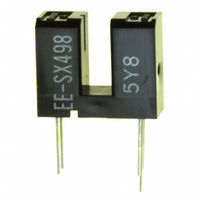EE-SX498 Omron, EE-SX498 Datasheet

EE-SX498
Manufacturer Part Number
EE-SX498
Description
IC,Photo Gap Detector,1-CHANNEL,Gap-1c
Manufacturer
Omron
Datasheet
1.EE-SX498.pdf
(2 pages)
Specifications of EE-SX498
Sensing Distance
0.118" (3mm)
Sensing Method
Transmissive
Output Configuration
NPN - Open Collector/Light-ON
Mounting Type
Through Hole
Current - Supply
3.2mA
Voltage - Supply
4.5 V ~ 16 V
Package / Case
PCB Mount
Aperture Width
0.5 mm
Termination Style
Solder Pin
Lead Free Status / RoHS Status
Lead free / RoHS Compliant
Response Time
-
Lead Free Status / Rohs Status
Lead free / RoHS Compliant
Other names
EE-SX498
EESX498
OR783
Q901906
EESX498
OR783
Q901906
Available stocks
Company
Part Number
Manufacturer
Quantity
Price
Company:
Part Number:
EE-SX498
Manufacturer:
HEIMANN
Quantity:
1
■ Dimensions
Note: All units are in millimeters unless otherwise indicated.
■ Electrical and Optical Characteristics (Ta = 25 C)
132
Emitter
Detector
LED current when output is OFF
LED current when output is ON
Hysteresis
Response frequency
Response delay time
Response delay time
8.5 0.5
8.2 0.5
K
A
A
K
V
O
G
Terminal No.
Photomicrosensor (Transmissive)
EE-SX398/498
Cross section BB
Be sure to read Precautions on page 25.
Internal Circuit
Forward voltage
Reverse current
Peak emission wave-
length
Low-level output volt-
age
High-level output volt-
age
Current consumption
Peak spectral sensitivi-
ty wavelength
EE-SX398/498
0.5 0.1
Anode
Cathode
Power supply
(Vcc)
Output (OUT)
Ground (GND)
Item
10 0.2
Name
V
O
G
12.2 0.3
(9.2)
Four, C0.3
Unless otherwise specified, the
tolerances are as shown below.
3 mm max.
3
6
10
18
V
I
V
V
I
I
f
t
t
R
CC
FT
PLH
PHL
Photomicrosensor (Transmissive)
Dimensions
P
P
F
OL
OH
H
Symbol
mm
mm
(t
(t
mm
mm
PHL
PLH
Five, 0.25 0.1
Optical
axis
)
)
6
10
18
30
6.5 0.1
6.2 0.5
1.2 V typ., 1.5 V max.
0.01 A typ., 10 A max.
940 nm typ.
0.12 V typ., 0.4 V max.
15 V min.
3.2 mA typ., 10 mA max.
870 nm typ.
2 mA typ., 5 mA max.
15% typ.
3 kHz min.
3 s typ.
20 s typ.
Two, C1 0.3
Cross section AA
(2.5)
Tolerance
0.3
0.375
0.45
0.55
0.65
Five,
0.5 0.1
Value
■ Features
• Incorporates an IC chip with a built-in detector element and ampli-
• Incorporates a detector element with a built-in temperature com-
• A wide supply voltage range: 4.5 to 16 VDC
• Directly connects with C-MOS and TTL.
• High resolution with a 0.5-mm-wide sensing aperture.
• Dark ON model (EE-SX398)
• Light ON model (EE-SX498)
■ Absolute Maximum Ratings (Ta = 25 C)
Note: 1. Refer to the temperature rating chart if the ambient temper-
fier.
pensation circuit.
Emitter
Detector
Ambient tem-
perature
Soldering temperature
2. Complete soldering within 10 seconds.
ature exceeds 25 C.
I
V
I
V
I
V
(EE-SX498)
V
V
V
V
V
V
V
F
F
F
R
CC
CC
CC
CC
CC
CC
CC
CC
CC
= 20 mA
= 20 mA
= 5 mA (EE-SX498)
= 4 V
= 16 V, R
= 4.5 to 16 V, I
= 16 V
= 4.5 to 16 V
= 4.5 to 16 V
= 4.5 to 16 V (see note 1)
= 4.5 to 16 V, I
= 4.5 to 16 V, I
= 4.5 to 16 V, I
Item
Forward current
Reverse voltage
Power supply volt-
age
Output voltage
Output current
Permissible output
dissipation
Operating
Storage
L
= 1 k , I
OL
F
F
F
= 15 mA, I
= 15 mA, I
= 15 mA, I
= 16 mA, I
Condition
F
= 5 mA (EE-SX398), I
I
V
V
V
I
P
Topr
Tstg
Tsol
F
OUT
Symbol
R
CC
OUT
OUT
OL
OL
OL
F
= 0 mA (EE-SX398),
= 16 mA (see note 2)
= 16 mA (see note 3)
= 16 mA (see note 3)
50 mA
(see note 1)
4 V
16 V
28 V
16 mA
250 mW (see
note 1)
–40 C to 75 C
–40 C to 85 C
260 C
(see note 2)
Rated value
F
= 0 mA
Related parts for EE-SX498
EE-SX498 Summary of contents
Page 1
... A wide supply voltage range: 4 VDC • Directly connects with C-MOS and TTL. • High resolution with a 0.5-mm-wide sensing aperture. Two, C1 0.3 • Dark ON model (EE-SX398) • Light ON model (EE-SX498) Optical axis ■ Absolute Maximum Ratings ( 6.5 0.1 Emitter 6 ...
Page 2
... IC in turned from OFF to ON. 2. The value of the response frequency is measured by rotating the disk as shown below. 2.1 mm 0.5 mm 0.5 mm ■ Engineering Data Note: The values in the parentheses apply to the EE-SX498. Forward Current vs. Collector Dissipation Temperature Rating Ambient temperature LED Current vs. Ambient Temper- ature Characteristics (Typical) V ...













